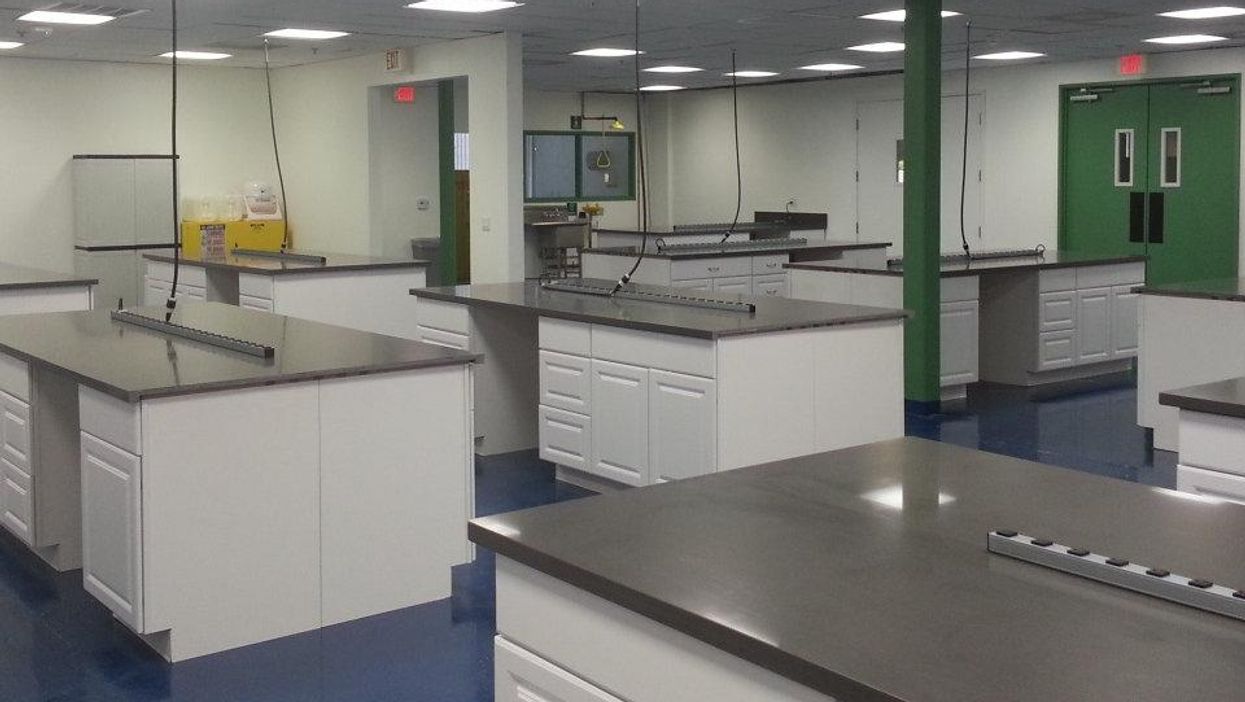How Lab Launch Aims to Make It Easier for Biotech Startups to Find Space
Keerthi Vedantam is a bioscience reporter at dot.LA. She cut her teeth covering everything from cloud computing to 5G in San Francisco and Seattle. Before she covered tech, Keerthi reported on tribal lands and congressional policy in Washington, D.C. Connect with her on Twitter, Clubhouse (@keerthivedantam) or Signal at 408-470-0776.

Llewellyn Cox is making a WeWork for bioscience professionals.
In a building along a hip arts district in Atwater Village, the molecular biologist and venture investor will open his next no-strings-attached lab space where he hopes startups can plant their roots in Los Angeles and help create therapeutics that save lives.
For $4,600 a month, a biotech startup can access a university-grade lab created by Lab Launch, which Cox founded in 2014. The company broke ground on the project Tuesday.
While the concept isn't new, there are few of these lab locations available in Los Angeles. Cox is part of a small group of life science professionals that are trying to bolster the region's biotech economy and prevent budding talent from straying to hubs in San Diego, Boston or San Francisco.
"The way to really build an economy is to start companies and grow companies and keep them here and hire people from here," Cox said. "And that was always a challenge when we were first starting."
Unlike tech upstarts that have humble beginnings in cramped garages or dingy basements, biotech startups need expensive lab equipment to store samples and dispose of biohazard disposal, not to mention cumbersome permitting. The upfront costs can be daunting and often deter would-be entrepreneurs, funneling them into larger companies or university incubators that might take over some patent ownership.
Cox's answer is Lab Launch.
"In the absence of all external incubators, you basically have to jump seat-first into the commercial real estate market while starting up a company, or try to sublease an industrial space in the middle of nowhere and build your own lab, and these are really hard things to do," Cox said.

Stephanie Hsieh runs one of the region's largest trade organizations for life science professionals, but when she first arrived in Los Angeles two decades ago, she couldn't even find a lab to lease for Meditope. The cancer therapeutics startup that she helmed needed a lab where it could store samples and experiment with new therapies. The options were limited, and she moved the company's development to San Diego where there was ample infrastructure in which to innovate.
"I joke that we innovated here and then it moved to San Diego or the Bay Area because there was no reason for it to stick here," said Hsieh, of who heads the Los Angeles' office for Biocom, a San Diego-based trade organization that represents more than 1,400 life science companies.
Los Angeles has thousands of square feet of lab space, much of it backed by universities, private companies and venture capital firms, adding up to thousands of square footage.
Westlake Village BioPartners recently built out a 30,000-square-foot lab space in its new incubator campus in Thousand Oaks for budding startups to use. UCLA's Magnify, a short-term lab space that houses startups, prioritizes companies in which UCLA has intellectual property.
But Lab Launch doesn't look for a stake in the company. These rentable spaces allow startups to maintain independence and control over their intellectual property. And Cox argues it gives the bioscience industry much needed infrastructure.
In 2019, the industry generated $44.2 billion in economic activity, according to a report by Biocom. And the county also received a fourth of all funding the National Institutes of Health allocated to California that year, more than any other county in the state.
"There is a significant opportunity with bioscience to expand L.A.'s innovation economy, nurture homegrown talent and contribute to the long-term economic health of the community and city at-large," said Los Angeles City Councilman Mark Ridley-Thomas, who has spearheaded efforts to build more facilities for the industry.
At the Atwater Crossing Arts and Innovation complex, not far from the Los Angeles River, Lab Launch's 11,000-square-foot space is under construction. It will provide six private lab units ranging from 800 to 3,500 square feet and can be further subdivided based on how many companies join. The labs are near a cluster of hospitals in Silver Lake like Children's Hospital and Kaiser Permanente, a metro stop and a slew of restaurants and coffee shops.
Created by scientists and entrepreneurs, Lab Launch's first space opened in seven years ago in Monrovia. The 11,000-square-foot lab space provides a place where startups can collaborate and experiment. The facility comes with ultra pure water (a common ingredient in the pharmaceutical industry) and freezers made to store samples.
The most common clients are small research and manufacturing organizations that contract with other, often larger, pharmaceutical or biotech companies and focus on specific niche verticals, like creating a singular pharma ingredient over and over again and only need a bit of lab space to do so. These organizations make the development and manufacturing part of biotech and pharmaceuticals cheaper.
KorvaLabs was one of the first companies at Lab Launch's Monrovia facility in 2015 to develop and test performance-enhancing drugs. The company stayed for two years before growing out of it and into another facility in San Dimas. It later worked with and was bought out by COVID-testing company Curative during the pandemic.
"Having these kind of established professionals around makes it a much more supportive and creative environment for those high growth startup companies that need help wherever they can get it," Cox said.
Hsieh already sees it happening.
"Just in the last five years, I'll say we've just seen explosive acceleration and growth," Hsieh said.
- The COVID-19 Crisis is Creating a New Biotech Culture in L.A. - dot.LA ›
- Can LA County's New Fund Get Local Biotech Startups to Stick ... ›
- The Labs Tasked with Making LA's COVID Testing Mandate Work - dot.LA ›
Keerthi Vedantam is a bioscience reporter at dot.LA. She cut her teeth covering everything from cloud computing to 5G in San Francisco and Seattle. Before she covered tech, Keerthi reported on tribal lands and congressional policy in Washington, D.C. Connect with her on Twitter, Clubhouse (@keerthivedantam) or Signal at 408-470-0776.





 Image Source: Tinder
Image Source: Tinder Image Source: Apple
Image Source: Apple